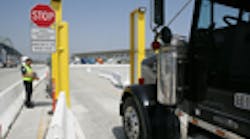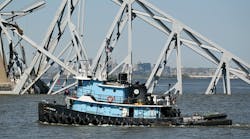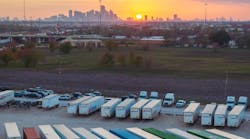The U.S. Environmental Protection Agency (EPA) has launched a SmartWay dray-truck initiative that it says will help clean up exhaust emissions at port facilities across the country. EPA has been joined by the Coalition for Responsible Transportation and the Environmental Defense Fund in the initiative.
Under the dray truck initiative, carriers would sign an agreement with EPA promising to track and reduce particulate-matter emissions by 50% and nitrogen oxides (NOx) emissions by 25% below the industry average over a three-year period. In turn, SmartWay dray-carriage partners would commit to using the cleaner trucks to haul 75% or more of port freight.
“U.S. ports generate jobs and are critical to our nation’s economy,” said Gina McCarthy, Asst. Administrator for EPA’s Office of Air and Radiation. “EPA’s SmartWay dray-truck initiative will help ports contribute to their local economies, while protecting the air quality, environment and public health of nearby communities.”
EPA noted that charter shipper partners in the new drayage-truck program include Best Buy, The Home Depot, Hewlett Packard, JC Penney, Lowe's, Nike, Target, and Walmart.
According to EPA, model-year 1994 and older drayage trucks emit approximately 60 times more fine particulate-matter emissions than 2007 and newer trucks.
Because many of the trucks used in port drayage operations are older short-haul trucks, there have been a number of pushes in recent years to clean the air around the ports, particularly the ports of Long Beach and Los Angeles in California.
The new program has the support of the American Trucking Assns. (ATA) even as ATA continues through the appeals process of its lawsuit against the Port of Los Angeles over its “Clean Truck” program.
“The EPA program is a new extension of the SmartWay program that ATA has been supportive of for a number of years,” Curtis Whalen, executive director of ATA’s Intermodal Motor Carrier Conference, told Fleet Owner. “This is an example of how things should work.”
Whalen, who said ATA delivered oral arguments to the 9th Circuit Court for its lawsuit appeal on June 10, also pointed out that ATA has no issue with ports attempting to clean the air through the use of newer equipment. The current lawsuit, he said, is really over the employment of drivers.
To help meet the goals of the Clean Truck program, which would require the phasing out or retrofitting of more than 16,000 trucks within five years, the Port of Los Angeles wants to require any driver going into or out of the port to be employed by a trucking company no later than Dec. 31, 2013. That measure would effectively eliminate owner-operators from operating at the ports. ATA, while in favor of the Clean Truck Program on the whole, objected to this provision and sued in 2008.
An appeals court initially ruled in ATA’s favor, but Federal Judge Christina Snyder overturned that decision on appeal. ATA then appealed to the 9th Circuit Court. A resolution of the current appeal, while on an “expedited” process, could still be four or five months away, according to Whalen. ATA initially sued the Port of Los Angeles and the Port of Long Beach, but the suit against Long Beach was dropped when that port agreed to drop the trucker-employee requirement.
EPA noted that charter shipper partners in the new drayage-truck program include Best Buy, The Home Depot, Hewlett Packard, JC Penney, Lowe's, Nike, Target, and Walmart.



